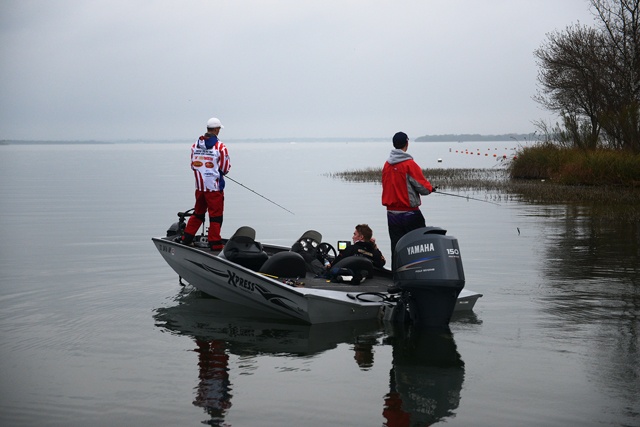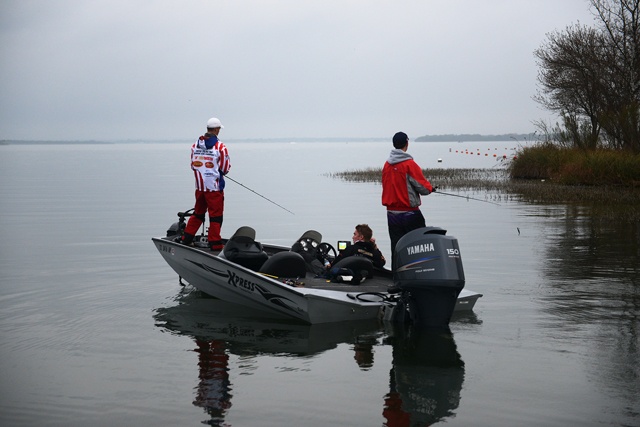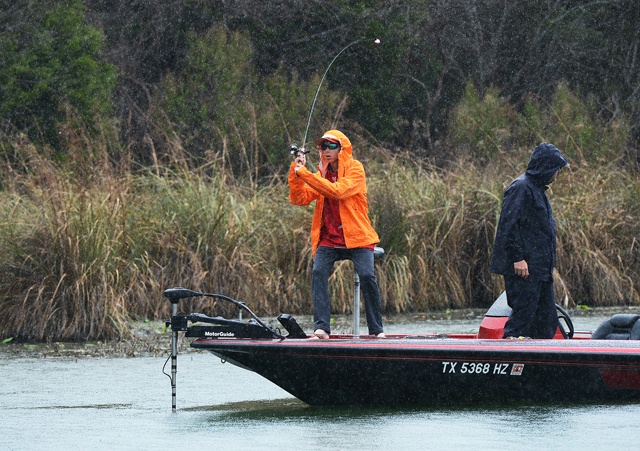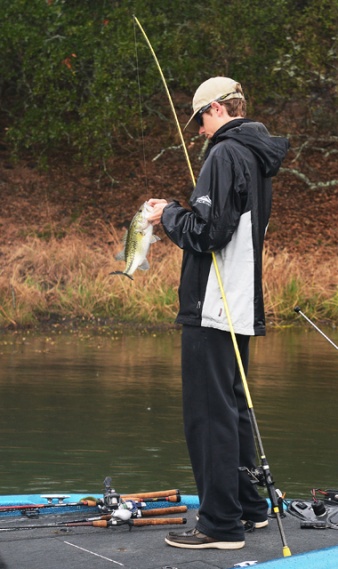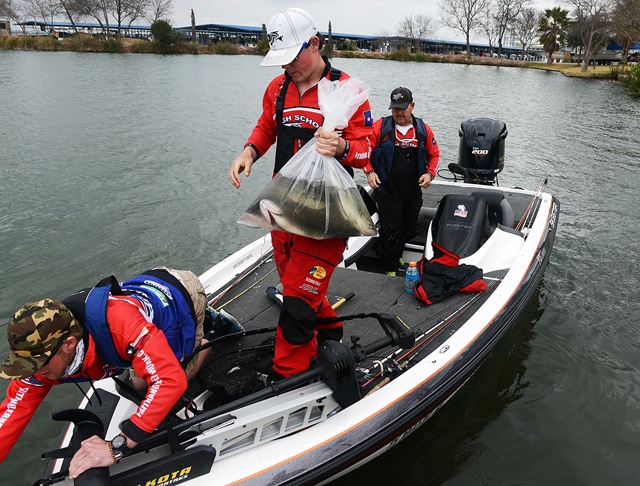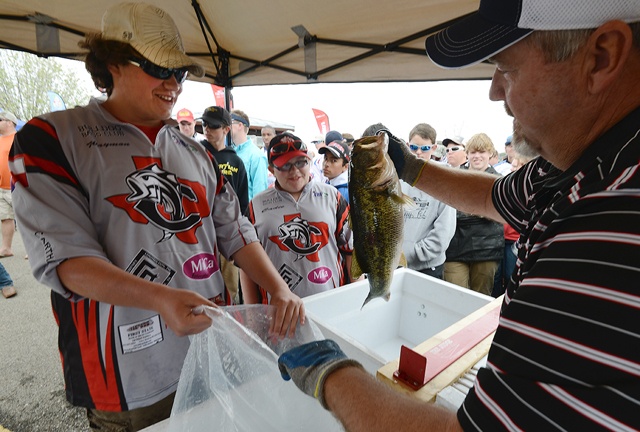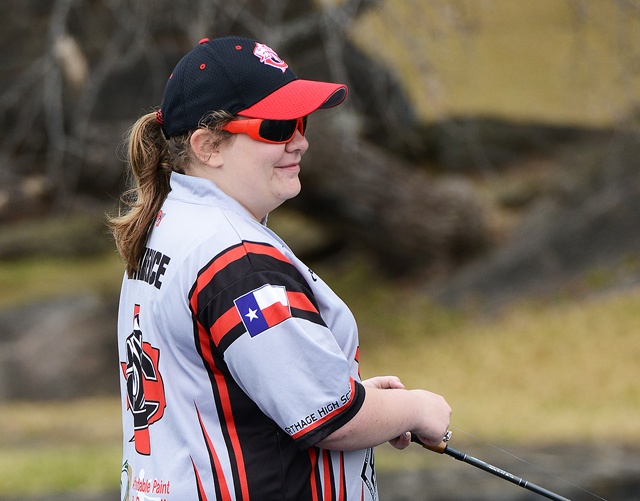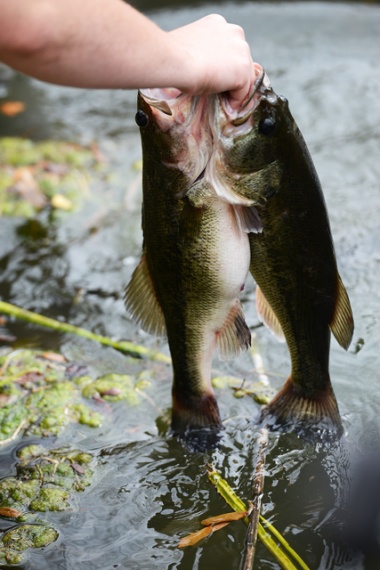Standing on the deck of his bass boat, Wyatt Frankens casts a lure toward the overgrown bank of a cove on Lake Lyndon B. Johnson near Marble Falls. The 18-year-old cranks the lure back and casts again, all the time waiting for the telltale sign of a largemouth bass strike.
Suddenly, just as a downpour lets loose, Frankens jerks his rod to set the hook as a fish takes the bait. Unfazed by the rain, fishing partner Clay Nash grabs a net to retrieve his friend’s catch, but even before they net the fish, Frankens knows this one isn’t a keeper. The too-small bass is quickly released, and the anglers get back to casting.
“When you set the hook and it doesn’t budge, and then the line starts going out into deeper water, that’s when you know you’ve got a big fish on,” he says. “That one wasn’t very big.”
Frankens and Nash make up one of 84 two-person teams competing in the 2014 Texas High School Fishing State Championship in March. Their team is one of four representing Corrigan-Camden High School from Southeast Texas. The tournament has attracted high school teams from throughout the state, competing to claim the state title sponsored by The Bass Federation and its Student Angler Federation. Frankens and Nash are especially eager to do well because they won the state championship in 2012 and tied for second last year.
Texas hosts hundreds of bass tournaments each year, from televised professional events offering hundreds of thousands of dollars in prize money to small club tournaments, where pride counts more than winnings. The state is also home to dozens of high school events that attract student anglers, many new to the sport, who fish for fun, trophies and sometimes scholarships.
The growing popularity of high school tournament fishing has swelled the number of participants, clubs and competitive events throughout Texas, especially in the last two years, says Bryan Thomas, adviser to the Lumberton High School fishing club. Thomas has watched interest in the sport explode in Southeast Texas.
“I think kids are attracted to fishing clubs because it’s something anyone can do that’s not limited to either boys or girls,” says Thomas, a Lumberton marketing program teacher. “This is a level playing field for everyone. You don’t have to be an athlete. We’re giving them a chance to represent their school in an organized competition that’s not a traditional sport.”
Thomas, an avid fisherman himself, organized the school’s club last year and was pleased when 45 students joined. This school year, that number ballooned to 82. There was so much interest in high school tournament fishing in the region that Thomas and two friends organized the Southeast Texas High School Fishing Association. The group attracted people from 15 high schools to an informal meeting last summer. By the time Thomas launched the association earlier this year, 31 schools, representing 750 student anglers, had joined. In one of the association’s first tournaments, 262 boats were put in the water at Sam Rayburn Reservoir.
“We’re 70 to 90 miles from two of the premiere bass fisheries in the state of Texas—Toledo Bend and Sam Rayburn,” says Thomas. “So the growth has a lot to do with how big fishing is here.”
Though not recognized as a high school sport, most fishing clubs, including Lumberton’s, are school-sanctioned extracurricular activities. The Lumberton school board approved the club. But just like school sports teams, Lumberton’s anglers must “pass to play,” Thomas says, adding he has had students who couldn’t fish in tournaments because of failing grades.
High school clubs attract a wide spectrum of fishing experience, from teens who have never fished, let alone entered a tournament, to those who have been fishing most of their lives. Frankens and Nash are the latter. They take the sport seriously and know the habits and seasonal activity of the fish they’re after.
The teammates, who will fish in eight to 10 tournaments this year, usually arrive a couple of days early to prefish a lake, identifying spawning beds, coves and underwater structures that, depending on time of year and weather, should hold fish.
“You can’t just go there on tournament day and fish,” says Frankens, who owns his own boat. “If you expect to do well, you need to go early and fish to find patterns in key areas and figure out what bait to key on.”
Each two-person team can keep five fish to be weighed. Teams are ranked by the total weight of their catch. Last year, when Frankens and Nash tied for second, the champions won by 2 ounces. “It was a pretty tough deal,” says Frankens, whose family is served by Sam Houston Electric Cooperative.
Education, as much as competition, is an important part of the mission of high school fishing teams, says Scott Anderson of Cedar Park, director of the Faith Angler Network High School Bass Team.
“Probably 75 percent of the kids on our team are new to fishing,” says Anderson, a member of Pedernales Electric Cooperative. “Maybe their parents don’t fish, so they haven’t grown up with it, but they see the excitement of it, and they see it’s an opportunity to belong to a team.”
The FAN team, unaffiliated with any particular high school, draws anglers from Williamson and Travis counties. Anderson says he became involved because he wanted to do more outdoor activities with his son, Colt, who competed in the state championship with his dad as boat captain. In high school tournaments sponsored by The Bass Federation, teams are accompanied on the water by an adult captain who provides and operates the boat but does not fish. Anderson says captains serve as mentors and coaches, especially to those just learning the sport.
“Fishing is part skill, part time out on the water and part luck,” says Anderson. “We’re trying to teach them how to prepare and how to find the fish, and I’m seeing a lot of satisfaction when these kids finally catch something. Some have caught their first fish ever.”
Anderson also hopes the experience is something kids will continue and pass on to their children, as was the case with him.
“Man, there’s something about that fish pulling on the end of your line that really gets you hooked,” he says. “Hopefully, these guys will pass that on even though maybe their parents didn’t fish.”
Retired businessman and former pro tournament fisherman Bill Flanary of Kingsland volunteers with the Marble Falls High School team, which has 15 boats in the championship. He often volunteers as a boat captain and helps teach newbie anglers basic skills like knot-tying and bait selection. He also collects and repairs donated gear for those who come to the sport with none.
“It can get expensive,” he says, pointing at his bass boat with compartments filled with more than $3,000 in baits alone. “The kids that need help, we outfit them. This is a way a lot of tournament fishermen give back to this next generation.”
Back at Lake LBJ, teams have been on the water since first light, and as the 3:30 p.m. weigh-in approaches, boats begin to pull into the LBJ Yacht Club and Marina in Marble Falls. Parents and friends crowd the dock and a grass bank at the marina as anglers and boat captains, many wearing brightly colored club jerseys, pull fish out of live wells, placing them in large clear bags. Anglers watch competitors carry their bags of fish, some straining under the weight, to tanks of water next to the tournament stage. The fish are kept alive from the time they’re caught and while they’re weighed, then they’re released back into the lake. But not before each team has a chance to show off its catch on stage to a large, enthusiastic audience with cameras clicking as anglers hold up their fish and smile broadly.
Of course, not every boat catches its limit of five fish, and a few teams even come up empty, but tournament organizers announce that the winners, Joe Beebee and Will Brady of The Woodlands and College Park club, caught a tournament-record 32 pounds of fish. One of Anderson’s FAN teams, Dalton Denson and Nicklaus Langlois, caught the tournament’s biggest fish at 10 pounds, 3 ounces. In all, 232 fish were weighed.
Frankens and Nash finished sixth with a catch of 18 pounds, 9 ounces. The two, along with the other top eight teams, now qualify to fish in The Bass Federation’s High School Conference Tournament, which is a qualifier for the organization’s High School Fishing National Championship in spring 2015.
Frankens says he is proud of how he and his partner did and is excited to move on to the conference tournament. “We pretty much had a perfect day as far as catching fish,” he says.
——————–
Jeff Joiner is Texas Co-op Power editor.
